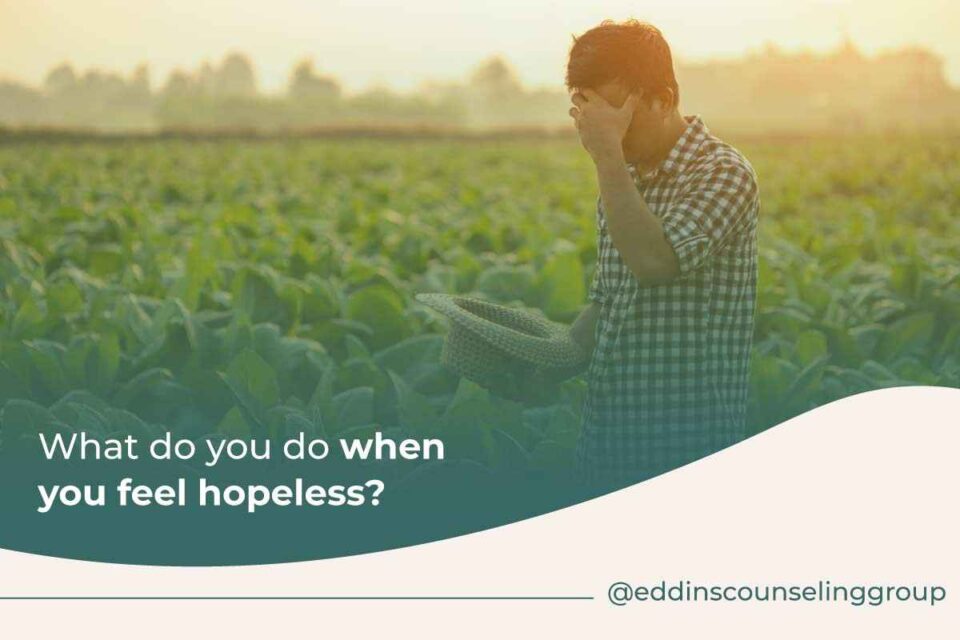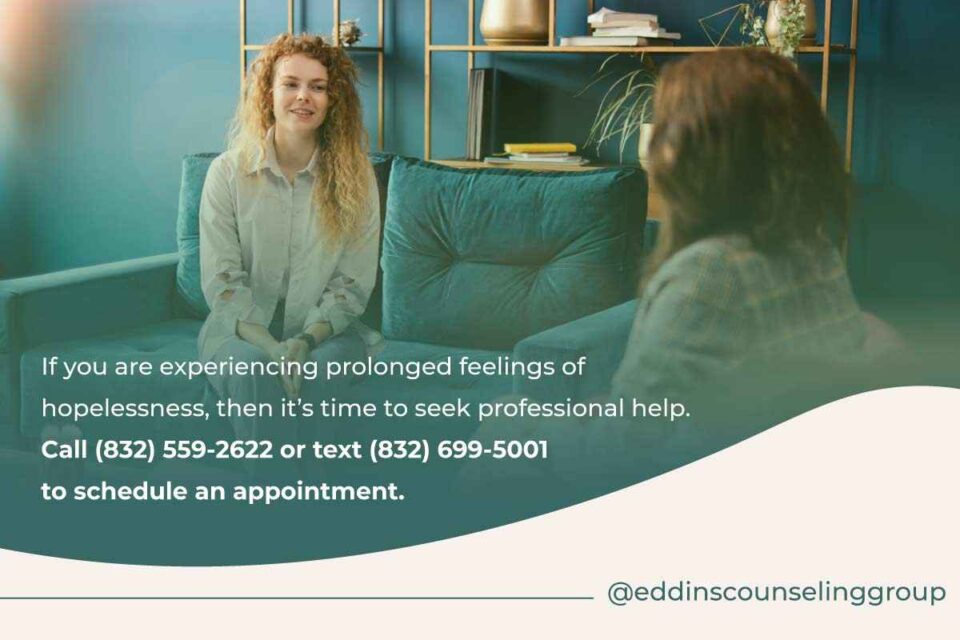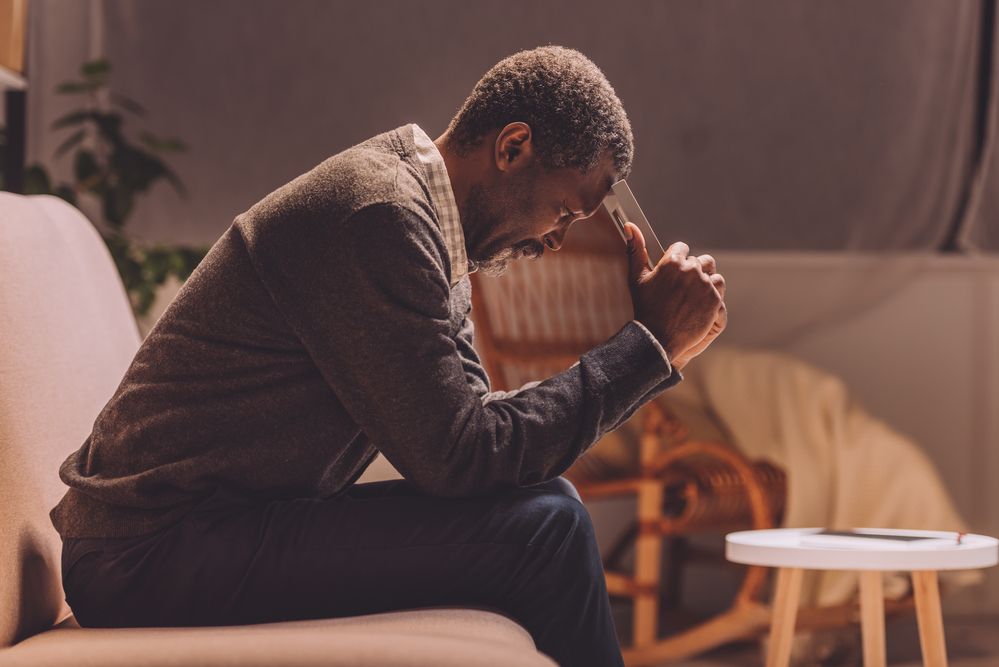March 20, 2023
What To Do When You’re Feeling Hopeless: 6 Best Strategies
Written by Sara Lane
Posted in Emotional & Mental Health and with tags: depression, hope, sadness

Feelings of hopelessness can be debilitating, and when you’re feeling too hopeless to even get out of bed in the morning, something’s wrong.
While it’s normal to feel small levels of hopelessness or depression from time to time, extended periods of hopelessness are never good.
Don’t settle for feeling hopeless any longer.
In this therapist-approved article, you will discover what you can do to overcome feelings of worthlessness.
Potential Causes of Hopelessness

Many things can cause hopelessness– even hearing world news can make anyone feel a lingering sense of doom. However, there are a few leading causes for general feelings of hopelessness:
- Relationship changes
- Losing a job
- Losing a loved one/ dealing with grief
- Recovering from a traumatic experience
- Chronic illness, pain, or fatigue
- Existential crises
- Natural disasters and world events
- Prolonged stress
- Hopelessness and Depression
By far, the most significant cause of general feelings of hopelessness comes from depression.
As measured by Beck’s hopelessness scale, people with major depressive disorder and other mood disorders experience increased feelings of hopelessness in conjunction with suicidal thoughts and ideation.
However, feelings of hopelessness may vary from person to person, and they may not come alongside thoughts of suicide.
Generally speaking, though, people with depressive disorders like Major Depressive disorder experience greater feelings of general hopelessness because of various cognitive distortions that come with a depressive episode.
Therapy helps people with depression work around these distortions.
Other Symptoms of Depression
Feeling hopeless in life isn’t the only symptom of depression, though. Other symptoms include:
- Insomnia
- Feelings of exhaustion/ oversleeping
- A general lack of energy
- Shortened temper
- General feelings of sadness, worthlessness, emptiness, or guilt
- Difficulty concentrating and forming thoughts
- Slowed thinking and reaction time
- Changes in appetite (either no appetite or constant hunger)
- Thoughts of suicide, self-harm, and death
- Unexplained physical problems, like aches and pains, headaches, or joint problems
If you are experiencing any of these symptoms alongside feelings of hopelessness, talk to a doctor or therapist as soon as possible.

How to Overcome Hopelessness
So, what do you do when you feel hopeless? While you could wait for the feelings to go away, depressive episodes may last a while, and it’s better to work yourself out of these feelings instead of stewing in them. When feeling hopeless, try these tasks:
1. Check-in With Yourself
First, take some time to check in with yourself.
- Have you had major life changes?
- Are you under a lot of stress?
Rate your hopelessness on a scale from 1 to 10, with 10 being the most hopeless and one being the least. Where are you on this scale?
Now is also the best time to ask yourself: “why am I feeling hopeless?” Finding the root cause of your hopelessness is the best place to start since you can further work on alleviating those feelings afterward.
For many people, there’s an underlying cause that makes them feel hopeless. For others, feelings of hopelessness just are, and that’s okay too.
Sometimes, we feel hopeless because we’ve forgotten to take care of ourselves. When you’re starting to feel hopeless, step back and ask yourself, “when was the last time I….”
- Ate something?
- Had some water?
- Spent time with friends?
- Went outside?
- Did something that I enjoy?
- Spent time by myself?
2. Debate Your Brain
Once you’ve determined your root cause, it’s time to get into an argument with your brain. When we’re depressed, our brains create cognitive distortions that shape our worldview into something pessimistic, and it can be especially difficult to get out of these types of thoughts.
So, you’ll need to make your brain justify itself in a debate.
Ask yourself the following questions, and see if your depressed brain can answer them:
- “Why do you feel hopeless?”
- “Are you sure that there’s nothing we can do?”
- From there, list some things you can do to alleviate hopelessness.
- “But I like [a thing], I want to do [the thing]. Why shouldn’t I?”
Next, it’s time to argue your case. Tell your brain why you think that things might start looking up or provide evidence as to why you’ve got things to look forward to.
When you think about potential positives in the face of depression, you’re opening up space for more positive thought patterns to start coming through. You can also use your debate time to remind yourself of all the times things have gotten better or you’ve worked your way out of a seemingly hopeless situation.
3. Set Small Goals
In the midst of hopelessness, staying positive about the future can be incredibly difficult. So, let’s set some small goals. In setting small, relatively achievable goals, you are actively engaging in problem-solving whilst also creating something to look forward to.
For example, if you’re feeling lonely and like your friends don’t enjoy your company, set a goal to reach out to them. If you feel as though you’ll never have any time for yourself again, try to schedule a week off into your life.
Your goals don’t have to relate to your hopelessness either, they can just be general things, like learning a new recipe, building something with your own hands, or finishing a book or tv show.
4. Practice Mindfulness
Dissociation is a common symptom of depression that usually comes alongside feelings of hopelessness. To help work your way out of feeling hopeless and break out of a dissociative spell, try practicing mindfulness techniques to get yourself in the present moment.
Practicing mindfulness includes anything and everything from simply sitting outside and experiencing nature to listening to cars pass by. When you practice mindfulness, your focus is on the present moment, as opposed to other thoughts. Try to experience all of your senses in your current setting.
5. Talk With a Friend or Family Member
Talking about your feelings with people you care about and those who support you is a great way to get a little pick-me-up when feeling down. When you’re feeling hopeless, why not try telling your loved ones how you feel?
While they aren’t your therapist, they can help you brainstorm solutions for feeling better and offer some words of encouragement to make you feel less alone.

6. Talk to a Therapist
That brings us to our last tip: talk to one of our Houston, Montrose, or Sugar Land therapists! If you are experiencing prolonged feelings of hopelessness, then it’s time to seek professional help.
A therapist is an excellent resource for building and practicing the skills necessary to overcome depression. They are best equipped to handle talking about difficult topics like suicide and self-harm.
Remember, you are not alone in your experiences. If you need help, get started with Eddins Counseling Group today.
Grounding & Self Soothing
Get instant access to your free ebook.
Why You Feel This Way
Get instant access to your free ebook.






















